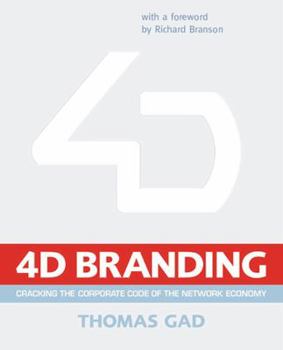4-D Branding: Cracking the Corporate Code of the Network Economy
4D Branding shows how to create future driven brands for brand driven companies. This description may be from another edition of this product.
Format:Hardcover
Language:English
ISBN:0273653687
ISBN13:9780273653684
Release Date:December 2000
Publisher:FT Press
Length:183 Pages
Weight:1.90 lbs.
Dimensions:0.8" x 6.4" x 9.5"
Customer Reviews
3 ratings
Reviewed in Design Research News
Published by Thriftbooks.com User , 23 years ago
Shaping and building brands is a central issue in design, and a key aspect of design management. Building brands effectively requires an appreciation of how customers - and potential customers - experience every aspect of the products and services we design. It also demands sensitivity to the complex system of physical, affective, and, cognitive issues involved in any product or service. This complexity is particularly subtle and important for products bundled with or supported by services, and for the hybrid service products that typify many offerings today.Thomas Gad is a respected practitioner in the field of brand development. He proposes three conceptual models to use in building brands. The 4-D brand model is organized around the concept of Brand Mind Space. Gad's schema considers four dimensions of a brand: functional, social, spiritual, and mental. The next model is the Brand Code. This code structures the attributes of a band in terms of product/benefit, mission, vision, values, styling, and positioning. Gad uses these two concepts to develop a number of applications, including a customer research instrument. He ends the book with 10 commandments for building a brand with a future.Gad argues that, "branding literature remains largely theoretical because of the mystery inherent in the subject." He argues that scientific interest in why effective brands work is less important than an appreciation for the fact that branding does work - and an ability to make makes work in practice. In contrast to this position, one might suggest that a robust theory of brands would contribute to better practice. While Gad does not take a scholarly approach, he does propose a theory for analyzing brand opportunities and building successful brands in series of well-written, insightful case studies. Gad's conceptual models and sensitizing concepts deserve consideration in the context of a larger research program.Review of European English edition published in Design Research News, Volume 6, Number 6, June 2001. ISSN 1473-3862.
Newest Top 10 Tool of Chief Brand Officer Association
Published by Thriftbooks.com User , 23 years ago
We recommend this book and its toolkit to our members, providing this summary of what 4D branding trains you to do:>Profile 4 dimensional branding you need: lowest dimension "function" suits product & advertised models of brand execution, but inhibits top "spiritual" dimension that corporate and global brands need >Experience futurised 4D brands: capable of leading organisational change and interacting organisation-wide service of value >Simplify DNA of futurised brands - vision, mission, values, styling, positioning, flagship product - so that the company can live the brand once you've taken the essential Brand Code on tour across company >Refresh the 4D Brand by intranetting such exercises as : concocting brand recipe for every audience, creating a mental movie for being the best brand in the world >Know why most company brands are still far down the learning curve as organisms of the network economy, and how the ideology of 4D branding can help you futurise just ahead of the competition <p>4D Branding is currently one of the top 10 toolkits in our members catalogue of frameworks used by Brand Leaders<p>Chris Macrae...
human branding starts here
Published by Thriftbooks.com User , 23 years ago
In the face of a great deal of "No Logo" brand hostility, it's good to see a response which paves the way for brands with more sensitivity and imagination. Have to admit that I picked this up in Europe because I liked the cover, but 4D proved to be an engaging and useful guide to more emotional branding. More process than puff, this is the best of the recent cluster of branding books, and shows that branding demands a commitment to imagination, innovation, responsibiliy and values. As Brit, Richard Branson (a walking brand if ever I saw one) says in the Foreword, "It is easy to be cynical about such things, but much harder to be successful." 200 pages less so now. Gad shares an enthusiasm and coherent approach to this stuff with Jesper Junde, who wrote Corporate Religion (the orange book!).





